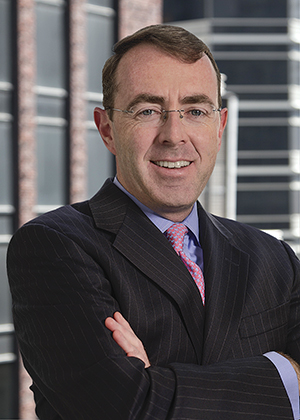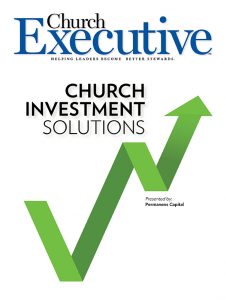 In many churches, cash reserves are either immediately applied to ministry expansion, or deposited into a traditional savings, CD or money market account. However, do these options really represent the best possible stewardship of those funds?
In many churches, cash reserves are either immediately applied to ministry expansion, or deposited into a traditional savings, CD or money market account. However, do these options really represent the best possible stewardship of those funds?
John Regan, Founding Partner and Chief Investment Officer at New York-based Permanens Capital, believes churches should consider investing cash reserves in relatively low-risk, short-duration, high-quality bond portfolios.

Q: Investing cash reserves might seem counter-intuitive to the nature and mission of a church. Why?
Regan: Churches are often very focused on expansion. Rather than accumulating reserves, churches often start new programs, acquire real estate or open satellite campuses. These activities add to budget expense and liabilities like maintenance capex, rather than add to reserves. As a result, there is a constant push-and-pull over creating reserves, versus starting new programs. The argument is to approach church governance in a similar fashion as to how trustees approach school governance. I serve as a trustee at one school and also serve on a number of other boards. These boards generally avoid spending endowment to hire more teachers or create new programs. Trustees often ask: What do we have to do to ensure that the school is here for the next 50-100 years?
The debate can be framed by the following question: Should church leaders think like trustees or CEOs of growth companies? Growth is wonderful. However, if you build a program — an afterschool program for children or single-mothers for example — and then misjudge your budget and are forced to discontinue the program next year, does that serve the good of the community? That push-and-pull, and the balance of growing at a “measured clip” versus “rapid clip,” is something that we did not really understand until we began work with our first church client.
Q: Churches often default to “investing” through a savings account, CD or money market account. In comparison, investing cash reserves might seem more time-intensive and, frankly, intimidating. What is the reality?
Regan: Investing through a savings account should not be considered ‘investing.’ CDs do not offer any real rate of return and carry a penalty for redeeming early. The purpose of investing reserves is two-fold. Earning a reasonable rate of return is important while also maintaining the ability to access the money if there is an urgent need. We have seen churches purchase annuities and class these as liquid reserves. However, an annuity is not a real investment. It is not liquid.
It is very common for a church to conduct business and invest reserves with a regional or community bank. However, many times that menu is limited, and so is the level of expertise. As a result, the church is presented with short-term, low-interest-rate options. These options are not the most liquid and tend to carry hidden fees and penalties for early redemption.
Q: How do the costs associated with investing cash reserves compare to setting up a savings account, CD or money market account?
Regan: A savings account will not cost much, but it also yields less than 0.2% of interest. An investment account will cost around 0.5% basis points but can return 4% to 5% of interest.
Q: When a church does choose to invest its cash reserves, how are those resources usually divided?
Regan: Our experience is that churches generally create two pools, with two very different purposes.

The first is a short-term, ‘emergency’ pool, which is the church’s operating cash reserves. Typically, this will not include any equity investments, just liquid bonds paying the church a reasonable rate of interest. Then, the church will create a second, longer-term, strategic pool. With this investment pool, the church is able to run a more balanced portfolio. Since this is money the church is going to need tomorrow, that pool should be structured like an endowment or a foundation with a focus on capital preservation, asset allocation and reasonable long-term growth.
Q: Why is it so important to identify an investment advisor who understands the “business” of a church and how it operates?
Regan: The first mistake we see churches make is putting their reserves in the hands of someone who is a member of the board or happens to be in the flock. This presents a conflict of interest and has its own set of governance issues. You never want to be put in a position where you may have to fire someone who is a contributing member of the church.
A church might also choose to hire a local or regional bank, if its options are limited. This brings a whole host of higher fees. With a bank and a broker model, there are fees and sales charges associated with having someone act as a fiduciary and asset manager. At Permanens, we do not have individuals as clients. We are not interested in finding the next person with $2 million or $3 million to plan his or her retirement fund. We specialize in institutional investing for endowment, foundation and non-profit clients.
Q: As a church is vetting its options, what should an investment advisor understand, uniquely, about a church client and how it manages its operations and finances?
Regan: Before recommending any investment option, an investment advisor needs to fully understand the church’s balance sheet. The investment advisor has to know what liabilities the church has coming and what, if any, real estate purchases the church might be planning to make. Understanding the potential liquidity need is paramount before any advisor can properly begin tailoring an investment program. The most important thing to convey is that there is a new option for churches, and it can give them the liquidity, low fees and access they might not get locally or regionally. This option comes with the same investment expertise that is being used to run school endowments, which have very similar balance sheet issues. Coupled with that, it is important to have the proper fiduciary oversight of those assets. There should be a real focus on capital preservation and ensuring the reserves are properly invested for the longer term benefits of the church.
— Reporting by RaeAnn Slaybaugh



I happened to google church investment and found this very interesting article, however i wanted to understand, in the answer given for the below question – is it a typo to say ” Since this is money the church is going to need tomorrow (or not going to need tomorrow), that pool should be structured like an endowment or a foundation with a focus on capital preservation, asset allocation and reasonable long-term growth. ”
Q: When a church does choose to invest its cash reserves, how are those resources usually divided?
Thanks
John